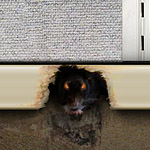 Jan is going over the production schedule, his words spilling out at maximum velocity. He’s well-versed in the intricacies of project management. It’s his passion, so there’s no need for him to search for words, no witty asides to pad the monologue. Further, he knows how to speak like an adult, with an even staccato cadence and an impressive vocabulary by any measure. He makes preemptive oblique references to counterpoints I might raise without breaking the flow, and raises a single eyebrow as he riffs on a matrix of potential implications. The man is a maestro of the salient point, a rhetorical surgeon.
Jan is going over the production schedule, his words spilling out at maximum velocity. He’s well-versed in the intricacies of project management. It’s his passion, so there’s no need for him to search for words, no witty asides to pad the monologue. Further, he knows how to speak like an adult, with an even staccato cadence and an impressive vocabulary by any measure. He makes preemptive oblique references to counterpoints I might raise without breaking the flow, and raises a single eyebrow as he riffs on a matrix of potential implications. The man is a maestro of the salient point, a rhetorical surgeon.
But Jan still eats like a starved rat–so I judge by the daily saliva symphony that winds its way down the hall into my cubicle–and all I can focus on at this moment is the glistening post-lunch rivulet clinging to his beard. When I first experienced it I thought the volume and clarity of Jan’s gustatory prowess might have something to do with the acoustic peculiarities of our office, which was converted originally from an industrial loading station. Perhaps the concrete walls of the past century worked in concert with the 21st century floor-to-ceiling frosted glass partitions to act like a massive inner ear, with myself at the focal point.
No matter how articulate Jan is, it’s impossible for me to take him seriously when I can still hear the juicy click of his last gulp ringing in my ears–it’s all I can do to block the thought of the sloshing of his gastric contents. I know that I tend to focus to the point of obsession, but it wouldn’t be an issue if he didn’t lick his apple after each bite to keep it from dripping. I witnessed as much as I passed by his office in search of a fire hatchet with which to behead him. So horrified was I that I lost my way and ended up wandering around somewhere in Human Resources, I don’t even know where. The image haunts me to this day–there are some things you cannot unlearn.
Continue reading
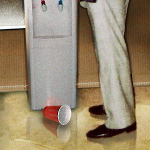 We’ve gathered in the cafeteria area.
We’ve gathered in the cafeteria area.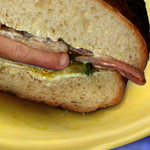 “How about… mustard? Mayo? And… lettuce?” As if I’m not sure the woman behind the counter has even heard of them. But of course she has. I’ve been ordering exactly the same sandwich here for just shy of four years. Some people study the menu each time they visit a familiar restaurant, but I order only one selection from any given restaurant. The first time I visit an eatery I figure out which item best suits me, and then lock it in. Because of this, ordering no longer requires thought, which would seem to be of great advantage to the introvert grown wary of human interaction. However, once again there are subtle yet vexing expectations relating to social conduct that foil simplicity. The wait staff isn’t aware that my dialogue is pre-scripted, so for them I must pretend to study the menu every time.
“How about… mustard? Mayo? And… lettuce?” As if I’m not sure the woman behind the counter has even heard of them. But of course she has. I’ve been ordering exactly the same sandwich here for just shy of four years. Some people study the menu each time they visit a familiar restaurant, but I order only one selection from any given restaurant. The first time I visit an eatery I figure out which item best suits me, and then lock it in. Because of this, ordering no longer requires thought, which would seem to be of great advantage to the introvert grown wary of human interaction. However, once again there are subtle yet vexing expectations relating to social conduct that foil simplicity. The wait staff isn’t aware that my dialogue is pre-scripted, so for them I must pretend to study the menu every time. The world as I knew it didn’t seem any less implausible the evening that mom died. No, I never really questioned what “real” was until about a month later, the day the stranger showed up on our doorstep. That may sound like the beginning of a second-rate cliche, but I prefer to think of it as an homage. The story actually begins a lot earlier though.
The world as I knew it didn’t seem any less implausible the evening that mom died. No, I never really questioned what “real” was until about a month later, the day the stranger showed up on our doorstep. That may sound like the beginning of a second-rate cliche, but I prefer to think of it as an homage. The story actually begins a lot earlier though.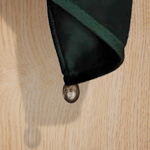 The first time I went through a car wash it was simple, because I had no idea what I was doing. That’s how it always is in the beginning. I am a little bird, beak open and pointed skyward. All I have to do is to look clueless and I’ll be told what to do. Drive up to the line? Sure. Align the front tire to the automated track? I think I can manage that. Pay at the other end? No problem.
The first time I went through a car wash it was simple, because I had no idea what I was doing. That’s how it always is in the beginning. I am a little bird, beak open and pointed skyward. All I have to do is to look clueless and I’ll be told what to do. Drive up to the line? Sure. Align the front tire to the automated track? I think I can manage that. Pay at the other end? No problem.
 I got to know Jane over the course of several weeks, in a recurring dream. In this dream I would be working at my desk when, invariably, she would show up and wait for me to notice her standing behind me, making faces. Then, around an ill-concealed grin, she would ask: “You ready?” And with those words it was as if she had unlocked something.
I got to know Jane over the course of several weeks, in a recurring dream. In this dream I would be working at my desk when, invariably, she would show up and wait for me to notice her standing behind me, making faces. Then, around an ill-concealed grin, she would ask: “You ready?” And with those words it was as if she had unlocked something. Well before I had a firm command of language, my best friend was a sky-blue blanket called “Meemuk.” Meemuk accompanied me wherever I went, clenched in my fleshy finger lobes, and with one corner of it typically providing me with some blankety nourishment.
Well before I had a firm command of language, my best friend was a sky-blue blanket called “Meemuk.” Meemuk accompanied me wherever I went, clenched in my fleshy finger lobes, and with one corner of it typically providing me with some blankety nourishment.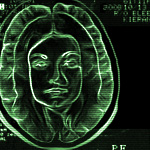 My mother removed her spectacles and studied them for a moment before dropping them into the breast pocket of her white overcoat. She never took that overcoat off, even in the evenings when she came home from the lab. “Okay,” she said, “I’ll tell you one thing about what I do, how does that sound?” Maybe I was too young to appreciate a more forthcoming explanation, but I had been persistent as only an eight year old can be. Inevitably the day came when she stopped to consider my question, rather than presenting me with the usual riddle, “a neuroscientist studies why you keep asking me what a neuroscientist studies.”
My mother removed her spectacles and studied them for a moment before dropping them into the breast pocket of her white overcoat. She never took that overcoat off, even in the evenings when she came home from the lab. “Okay,” she said, “I’ll tell you one thing about what I do, how does that sound?” Maybe I was too young to appreciate a more forthcoming explanation, but I had been persistent as only an eight year old can be. Inevitably the day came when she stopped to consider my question, rather than presenting me with the usual riddle, “a neuroscientist studies why you keep asking me what a neuroscientist studies.” In
In